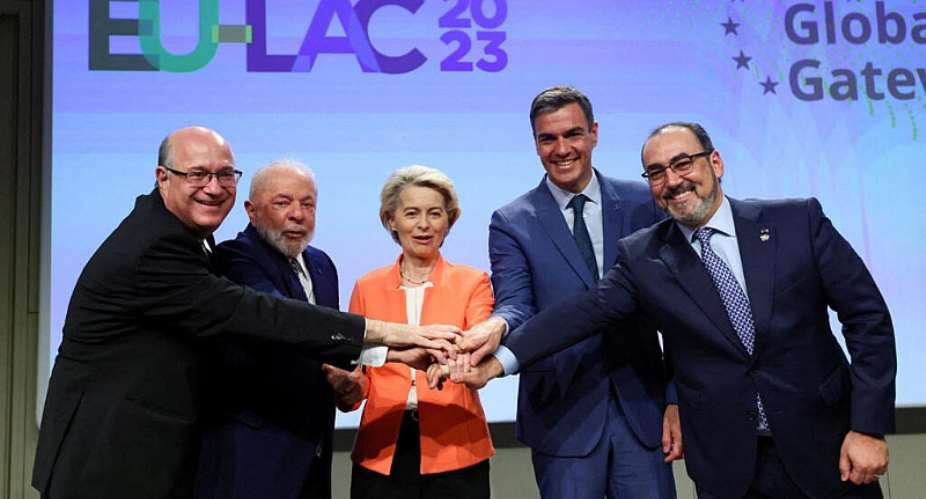A summit between European and Latin American countries closed with a watered-down statement that condemned the war in Ukraine but failed to mention Russia. Yet, critics see the summit as a step forward in relations between the EU and the global south.
Ambassadors worked through much of the night and into the second day of the EU-CELAC summit 2023 to compromise on thorny issues like Russia's invasion of Ukraine, slavery and the embargo against Cuba with talks hung up over the reservations by Moscow's allies in the region, Cuba, Venezuela and Nicaragua.
"It was a good summit for both sides in the sense that it took place," Professor Bert Hoffmann, head of the German Institute for Global and Area Studies (Giga) told RFI.
During the previous meeting of the 60-country group (27 EU members and 33 Latin American and Caribbean countries) in 2015, high level representatives stayed away.
But this time, with the presence of heads of state and governments, including French President Emmanuel Macron, Brazilian President Luiz Inácio Lula da Silva, and other top EU and Latin American leaders "showed the interest and the Latin American side clearly made some points they had not made before, like mentioning slavery and the need for apologies or reparations and that showed the increased self-confidence of the region," according to Hoffmann.
Nevertheless, the final 41 point document was, due to the many disagreements, not a "joint" declaration, but a watered-down compromise.
In its criticism of the war in Ukraine, it did not mention Russia by name, but merely expressed "deep concern".
The EU-CELAC countries also "reiterated support for the Black Sea Grain Initiative and the efforts of the UNSG to secure its extension" without condemning Russia's recent announcement that it was suspending the deal.
Vaguely worded
But according to Brazilian President Luiz Inácio Lula da Silva, the statement was "very reasonable" and responds to the "interests of everyone".
He played down the lack of harsh criticism vis-à-vis Russia: "The discussion revolved around the vision of 60 countries, and one must assume that not everyone will agree (...) I think the discussion on Ukraine took the right amount of time, and there was nothing we didn't know," he said.
Apart from the extremely weak criticism of Russia's invasion of Ukraine, the document contains the participant's "profound regret" over the suffering inflicted on "millions ... as a result of the trans-Atlantic slave trade."
The statement also expresses "opposition to the ... embargo against Cuba" but consists, for the large part, vaguely worded references to bilateral relations and climate change.
French President Emmanuel Macron, speaking to reporters at the venue said Russia's decision to end the grain deal was widely condemned. "It is clear," he said, "that the emperor has no clothes, if not to say the Tsar. We can see that Russia has brought food into the war and starving countries that are already struggling," but this critical language did not make it into the joint declaration.
Geopolitical competition
The EU-CELAC meeting takes place just ten days before Moscow holds a Russia-Africa summit in Saint Petersburg, according to the official Tass news agency to be held from July 26 through 29.
"W e have a new geopolitical competition between EU, US, China, Russia," says Hoffmann, which already existed but was largely polarised as a result of the war in Ukraine.
"This renewed attention to the countries of Asia, Africa, Latin America is part of this new context of geopolitics where it's as much about trade and securing trade or investments or resources" and now a "new political military dimension with the Ukraine war," he says.





 Some people expect us to be dogmatic, sycophantic supporters of Akufo-Addo even ...
Some people expect us to be dogmatic, sycophantic supporters of Akufo-Addo even ...
 NDC Campaign: James Agyenim Boateng is the right man to handle communications
NDC Campaign: James Agyenim Boateng is the right man to handle communications
 Mahama pledges to contribute to the development of Gonja Kindom
Mahama pledges to contribute to the development of Gonja Kindom
 “Ghanaman Time”: We've normalized the abnormal, accepted the unacceptable — Dots...
“Ghanaman Time”: We've normalized the abnormal, accepted the unacceptable — Dots...
 Bawumia begins nationwide campaign for president in Eastern Region today
Bawumia begins nationwide campaign for president in Eastern Region today
 Bawumia kicks off nationwide campaign with “bold solutions” for Ghana's future
Bawumia kicks off nationwide campaign with “bold solutions” for Ghana's future
 You cannot choose your successor; it’s only God who can – Mahama to Akufo-Addo
You cannot choose your successor; it’s only God who can – Mahama to Akufo-Addo
 Ejisu by-election: Vote for independent candidate Kwabena Owusu Aduomi to uphold...
Ejisu by-election: Vote for independent candidate Kwabena Owusu Aduomi to uphold...
 IT is a major skill needed for the job market - Industry Players
IT is a major skill needed for the job market - Industry Players
 S. Africa's ex-president Zuma makes surprise comeback
S. Africa's ex-president Zuma makes surprise comeback
